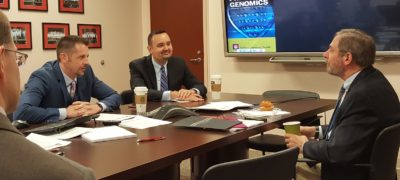July 16, 2017:
The Indiana University Melvin and Bren Simon Cancer Center hosted Doug Lowy, the acting director of the National Cancer Institute, for a full-day visit on June 28.
(Photo: Drs. Schneider (left) and Milan Radovich (middle) explain their work on the next generation of personalized medicine with Dr. Doug Lowy, acting director of the National Cancer Institute. Dr. Lowy visited the IU Simon Cancer Center on June 28. Photo credit: IU Simon Cancer Center)
In a series of small-group discussions in the morning, he met with cancer center members (members’ names appear in bold) and others to learn about:
- Pediatric genomics with D. Wade Clapp, MD, and Jamie Renbarger, MD, MS
- Breast cancer research program with Hari Nakshatri, PhD
- Komen Tissue Bank at IU Simon Cancer Center with Anna Maria Storniolo, MD
- Precision health with Bryan Schneider, MD, and Milan Radovich, PhD
- Big Ten Cancer Research Consortium and the Hoosier Cancer Research Network with Bert O’Neil, MD, Cynthia Burkhardt, RN, and Chris Fausel, PharmD
- Kenya and cancer with Patrick Loehrer, MD, Bob Einterz, MD, and Terry Vik, MD
In the afternoon, Dr. Lowy presented “NCI-supported Research: Concepts, Opportunities, and Applications” to cancer center members and others. Watch.
When asked about what surprised him most about his visit, Dr. Lowy mentioned the statewide health care system and the oncology work in Kenya.
“I was unaware of the extensiveness of the Indiana-wide cancer treatment network and how long it has been going on and how effective it seems to be, both for doing research and for what I assume is improving the quality of care statewide. That really struck me,” he said.
As for the cancer center’s global reach in Kenya, he said: “The Kenya project seemed to me that it’s a remarkable blend of delivering care and continually improving quality of care while at the same time conducting relevant research in the population.”
Dr. Lowy visited the Purdue University Center for Cancer Research the following day.
He is visiting the cancer centers to understand the strengths of each cancer center and the unique aspects of their programs in advancing cancer research and the cause, diagnosis, prevention, and treatment of cancer.
Article source: IU Simon Cancer Center
About the Big Ten Cancer Research Consortium: The Big Ten Cancer Research Consortium was created in 2013 to transform the conduct of cancer research through collaborative, hypothesis-driven, highly translational oncology trials that leverage the scientific and clinical expertise of Big Ten universities. The goal of the Big Ten Cancer Research Consortium is to create a unique team-research culture to drive science rapidly from ideas to new approaches to cancer treatment. Within this innovative environment, today’s research leaders collaborate with and mentor the research leaders of tomorrow with the unified goal of improving the lives of all patients with cancer.
About the Big Ten Conference: The Big Ten Conference is an association of world-class universities whose member institutions share a common mission of research, graduate, professional and undergraduate teaching and public service. Founded in 1896, the Big Ten has sustained a comprehensive set of shared practices and policies that enforce the priority of academics in the lives of students competing in intercollegiate athletics and emphasize the values of integrity, fairness and competitiveness. The broad-based programs of the 14 Big Ten institutions will provide over $200 million in direct financial support to almost 9,500 students for more than 11,000 participation opportunities on 350 teams in 42 different sports. The Big Ten sponsors 28 official conference sports, 14 for men and 14 for women, including the addition of men’s ice hockey and men’s and women’s lacrosse since 2013. For more information, visit www.bigten.org.















Subscribe to the Big Ten CRC Newsletter X
X Facebook
Facebook YouTube
YouTube